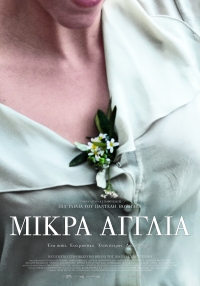Μικρά Αγγλία (Pantelis Voulgaris, 2013): Greece
Reviewed by Katrina Storton. Viewed in theater.
 (8/15/16 Update: This film is now available on Netflix with subtitles.)
(8/15/16 Update: This film is now available on Netflix with subtitles.)
I was recently given the amazing opportunity to attend the Los Angeles Greek Film Festival on its opening day of June 4th. The main full length film (amongst other short films) was Μικρά Αγγλία, known as Little England, in English. The film spoke to me as I feel it did to everyone else attending the film festival. Little England is based in Greece at the beginning of the interwar period and ends in the 1950s. While the film focuses on the Saltaferou family and their trials and tribulations, the main focus is on the sisters Orsa and Moscha Saltaferou and their love for the same man, Spyros Maltabes. Don’t be fooled by this description, this isn’t any normal love triangle. Unlike other films that show love triangles as almost something you wish to have in your love life. Little England displays the unhappiness that can be presented in arranged marriages, family secrets and having to ‘share’ your true love with another loved one. There is a saying “If you truly love something, set it free.” Little England exemplifies that statement, but also shows the results of it, negative and positive. Nevertheless, Little England is a phenomenal film and highly relatable by anyone who has grown up in a household with parents or grandparents who tell stories of the ‘old country’.
The cinematography is also worth mentioning. The camera tended to focus on objects or features which weren’t important to the scene, making what was going on seem distant or disconnected. A lot of close up shots of Orsa helped show the emotion in her eyes and many distant shots help show the relationship status between characters, usually showing their closeness, distance or body language towards each other.
Overall, Μικρά Αγγλία is a laughing film, a crying film and a must see film for those yet to discover the 4 meanings of love, in a Greek life.
Save
7 Comments
Jump to comment form | comments rss [?]